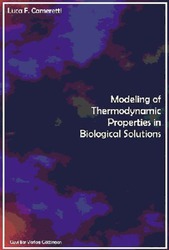| Fachbereiche | |
|---|---|
| Buchreihen (97) |
1382
|
| Nachhaltigkeit |
3
|
| Gesundheitswesen |
1
|
| Geisteswissenschaften |
2372
|
| Naturwissenschaften |
5408
|
| Ingenieurwissenschaften |
1798
|
| Allgemeine Ingenieurwissenschaften | 292 |
| Maschinenbau und Verfahrenstechnik | 863 |
| Elektrotechnik | 690 |
| Bergbau- und Hüttenwesen | 30 |
| Architektur und Bauwesen | 75 |
| Allgemein |
98
|
|
Leitlinien Unfallchirurgie
5. Auflage bestellen |
|
Erweiterte Suche
Modeling of Thermodynamic Properties in Biological Solutions
Luca Cameretti (Autor)Vorschau
Inhaltsverzeichnis, Datei (160 KB)
Leseprobe, Datei (600 KB)
More than 90% of the production costs for amino acids, peptides, and proteins are attributed to their purification. Therefore, reliable information about phase behavior of biological systems is of essential financial importance for the design of separation units. In general, bioproducts are obtained by fermentation in aqueous solutions that may also contain electrolytes. The phase behavior of such solutions is particulary dependent on salt type, ionic strength, and pH.
In this thesis a model based on the PC-SAFT equation of state is developed for the description of thermodynamic properties of aqueous electrolyte solutions. This model is also applied for aqueous amino acid and peptide systems. The aim is to simultaneously describe various system properties – densities, vapor pressures, activity coefficients, and solubilities – with a minimum number of adjustable model parameters. After successful modeling of the binary systems, ternary water/electrolyte/amino acid systems are investigated.
Additionally, the meta-stable liquid-liquid coacervation in protein solutions as well as the second osmotic virial coefficients, system densities, and solubilities of proteins are scrutinized based on aqueous hen egg-white lysozyme/NaCl solutions. Both, the PC-SAFT model and a model based on potential of mean force (PMF) are tested for their applicability regarding such complex mixtures. It is shown that the PC-SAFT approach fails in the description of protein solutions whereas the PMF ansatz yields, at least, good qualitative agreement between model and experiment.
All models used for this thesis were implemented in Fortran. The evaluation of data was carried out with Matlab®.
| ISBN-13 (Printausgabe) | 3867278482 |
| ISBN-13 (Printausgabe) | 9783867278485 |
| ISBN-13 (E-Book) | 9783736928480 |
| Sprache | Englisch |
| Seitenanzahl | 152 |
| Auflage | 1 Aufl. |
| Band | 0 |
| Erscheinungsort | Göttingen |
| Promotionsort | TU Dortmund |
| Erscheinungsdatum | 14.01.2009 |
| Allgemeine Einordnung | Dissertation |
| Fachbereiche |
Allgemeine Ingenieurwissenschaften
|
| Schlagwörter | Perturbation Theory, PC-SAFT, Potential of Mean Force, Elektrolyte (Alkalihalide, -hydroxide, -sulfate, -nitrate, Erdalkalisalze, Ammoniumchlorid), Aminosäuren (Glycin, Alanin, Serin, Prolin, Valin, Arginin, Lysin, Threonin, Histidin, ®-/¯-/°-Aminobuttersäure, ®-/°-Aminovaleriansäure), Peptide (Diglycin, Triglycin, Dialanin, Alanylglycin, Glycylalanin), Protein (Hühnereiweis Lysozym), Dampfdruck, (mittlerer ionischer) Aktivitätskoeffizient, Dichte, Löslichkeit |








